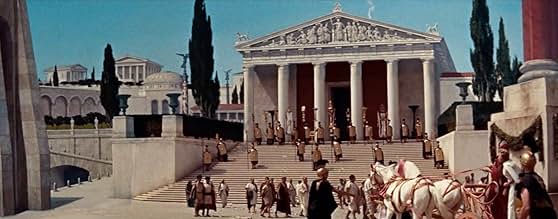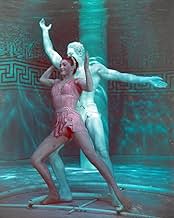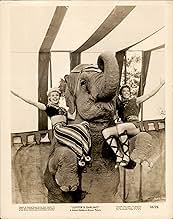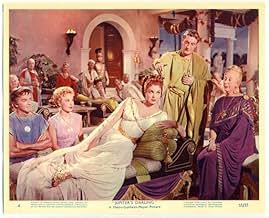Agrega una trama en tu idiomaFabius loves his beautiful but vulnerable city, Rome, and he also loves his beautiful but invulnerable fiancée, Amytis. Fascinated by the tales she has heard about Hannibal, who is about to ... Leer todoFabius loves his beautiful but vulnerable city, Rome, and he also loves his beautiful but invulnerable fiancée, Amytis. Fascinated by the tales she has heard about Hannibal, who is about to attack Rome, Amytis is driven by curiosity to the edge of his camp. Captured, she makes a ... Leer todoFabius loves his beautiful but vulnerable city, Rome, and he also loves his beautiful but invulnerable fiancée, Amytis. Fascinated by the tales she has heard about Hannibal, who is about to attack Rome, Amytis is driven by curiosity to the edge of his camp. Captured, she makes a last request of the indifferent Hannibal...that he spare the city. She offers to lead him ... Leer todo
- Dirección
- Guionistas
- Elenco
- Cpl. Ballol
- (sin créditos)
- Soldier
- (sin créditos)
- Citizen
- (sin créditos)
- Slave
- (sin créditos)
- Citizen
- (sin créditos)
- Dirección
- Guionistas
- Todo el elenco y el equipo
- Producción, taquilla y más en IMDbPro
Opiniones destacadas
It's a silly movie but an enjoyable one that is better than its reputation suggests. The sets and costumes are all colorful and bright, though some today might find it all a bit corny. Esther is fit and gorgeous (those legs!) with a lovely underwater swimming number where she 'dances' with statues that come to life. A real classic and the highlight of the film. She does well in the romantic scenes with Howard Keel, who sings some forgettable tunes. I especially liked that Esther's character was so sexy and fun. Of the three films Keel and Esther did together, this is the one where they have the best chemistry. The cast backing up the leads is solid. George Sanders plays Fabius with as much seriousness as he can muster considering how silly the whole thing must have seemed to him. Richard Hayden is oddly enjoyable as the singing storyteller Horatio. Others in the cast include William Demarest, Douglas Dumbrille, Michael Ansara, and dancing couple Gower & Marge Champion. The Champions perform the "If This Be Slavery" number ("Hooray for slavery!"), which has some lyrics that are funny when taken out of context. Most of the songs and dance numbers are nothing to write home about but none are terrible. Anything with Esther is worth seeing just for her smile...and those legs!
Esther Williams is engaged to Roman leader George Sanders, but she's drawn to Howard Keel, who's made it his mission to attack and conquer Rome. It's quite a love triangle, because Howard Keel isn't the most likable guy ever written, but he sings powerfully seductive songs and even picks up and moves a real leopard guarding Esther's bed! My one question is why didn't George Sanders get any songs? He showed off his beautiful voice in Call Me Madam, but maybe Hollywood didn't want to give Howard Keel any competition-not that he'd really have any. He's clearly the manly macho one in the movie, and he's scantily dressed, giving audiences an up close and personal view of his macho manliness.
Still, while Howard Keel is able to save a couple of songs in the movie, unless you're an Esther Williams fan, you probably won't end up renting this one. Underwater dancing is a very specialized talent, one that not everyone likes to watch. Then again, you might get a kick out of Richard Haydn sounding very much like his famous Caterpillar role from Alice in Wonderland. Or, you might enjoy looking at Howard Keel in a Greek warrior outfit that barely fits him. One more thing: This is a little criticism, but I do have it-there's a Marge and Gower Champion song performed alongside a couple of elephants, and I couldn't help but feel sorry for the animals. One was supposed to fall over and roll around, while the dancers make fun of it, but to me, it wasn't cute.
This film is about one of history's great military failures - Hannibal Barca, the Carthagenian tactical genius who is remembered for bringing his army over the alps (including his elephants - a feat of arms that is still marvelled at). He was of Phoenician ancestry, being from the city of Carthage in North Africa (founded by the Phoenicians). He probably was dark skinned, like most North Africans. He probably did not look like Howard Keel, a good actor and singer (KISS ME KATE, CALAMITY JANE - the latter as Wild Bill Hickok, THE DAY OF THE TRIFFIDS). Since this is a musical comedy the audience will swallow it, but from a historical realistic view the role cried for a singer and actor with a darker skin - someone like Paul Robson. However, for age reasons and political reasons Robson would have been impossible in 1955.
The basis of this film is Robert Sherwood's play, THE ROAD TO ROME, which was a comedy against war. Actually beyond this is the fact that Hannibal, having won five great victories against the Romans (capped by the total routs of Roman arms at Lake Transemene and Cannae) had the "road to Rome" open for his army - had he moved he would have destroyed Rome, and history would have been centered in North Africa for quite awhile. His dawdling lost him his chance, and the tactics of the Roman General Fabius Maximus (to snipe at Hannibal's army over a long period of time, until it was tired and demoralized) won the war after a decade. Fabius was killed in a skirmish, but his place was taken by Scipio Africanus, who delivered the knock-out blow at Zama in 202 B.C. Hannibal fled Carthage, to commit suicide in Macedonia a number of years later when he was about to be handed over to the Romans. Carthage was stripped of it's power and wealth, but nearly sixty years later it was purposely destroyed by the Romans (at the prodding of Cato the Elder, a bigotted Senator) in the pointless Third Punic "War". The population was killed or enslaved, and the town levelled - the site ploughed over with salt so nothing would ever grow there. Hence the bitter term: "Carthagenean Peace". But the memory of Rome's close call at the hands of this genius was a constant nightmare even at the height of their empire. In the AENIAD, Vergil has the doomed North African princess Dido die, praying that her descendant (Hannibal) destroys the Romans. Prior to the collapse of the Empire at the hands of "barbarian" tribes Hannibal was Rome's closest call to destruction.
This play may have been good in 1927, but it dates now. Moreover, Sherwood, despite some stage credits like IDIOT'S DELIGHT, is best remembered for his dual biography (which is still useful) ROOSEVELT AND HOPKINS, about FDR and his advisor Harry Hopkins. Keeping this in mind, my use of the term "minor" is understandable. It is not like a musical based on, say a play by Eugene O'Neill or Tennessee Williams. [Actually O'Neill plays have been turned into musicals: NEW GIRL IN TOWN is based on ANNA CRISTIE, and AH WILDERNESS! was turned into the musical TAKE ME ALONG.]
Williams and Keel are attractive together, but the Burton Lane score is not that good (a number with Marge and Gower Champion about the elephants seems very silly now). George Sanders gives his normally good performance, his Fabius being a mother-dominated type (momma is Norma Varden, who disapproves of his choice of Williams as a wife), but who is an intelligent military leader - witness how he realizes that the best way to fight Hannibal is not to present a pitched battle, but to wear him down. The action of the film is in 217 B.C., when the war was peaking for Hannibal, and Fabius did not die for nearly six years more. Interestingly enough Douglas Dumbrille has a brief part as Scipio, reminding us that the military affairs would remain in highly capable hands at the end. William Demerest is properly flustered a few times, constantly ready to give the signal for the final advance of the Carthageneans on Rome, only to find Hannibal unavailable or unwilling to tell him to do so. One wishes more had been done with Richard Haydn, as a historian named Horatio, but he seems wasted here. A film curiosity - not a great film though.
¿Sabías que…?
- TriviaWilliams refused to do the scene where Amytis rides a horse off a cliff and MGM refused to cut the scene. Platform diver Al Lewin did the stunt in one take - and broke his back in the process.
- ErroresDuring the "slave market" dance number Marge Champion at one point has a small basket on her head. It falls off and lands on the ground between her and Gower. They pull in for a closeup and when they pull back the basket is gone.
- Créditos curiososIn opening credits: "In 216 B.C., Hannibal the Barbarian marched on Rome. The history of this great march has always been confused. This picture will do nothing to clear it up."
- ConexionesFeatured in 1955 Motion Picture Theatre Celebration (1955)
- Bandas sonorasHoratio's Narration
(uncredited)
Music by Saul Chaplin
Lyrics by George Wells, Harold Adamson and Saul Chaplin
Sung by Richard Haydn
Selecciones populares
- How long is Jupiter's Darling?Con tecnología de Alexa
Detalles
- Fecha de lanzamiento
- País de origen
- Idioma
- También se conoce como
- Jupiter's Darling
- Locaciones de filmación
- Productora
- Ver más créditos de la compañía en IMDbPro
Taquilla
- Presupuesto
- USD 3,337,000 (estimado)
- Tiempo de ejecución1 hora 35 minutos
- Relación de aspecto
- 2.55 : 1



































